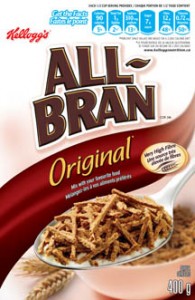Is food saltier in Canada than in the US?
 All-Bran is All-Bran, right?
All-Bran is All-Bran, right?
If you regularly eat a cereal like Kellogg’s All-Bran in the U.S., you’d assume that that cereal would taste the same in Canada.
Not according to a recent study by the group, World Action on Salt and Health (WASH).
They reported that many popular foods, including Burger King’s onion rings and Special K cereal, have far more sodium in Canada than they do south of the border.
Here’s more on what they found:
New research shows that people in some countries are being fed over twice as much salt in popular global brands as their counterparts elsewhere in the world.
World Action on Salt and Health (WASH) has surveyed over 260 food products available around the world from food manufacturers such as KFC, McDonalds, Kellogg’s, Nestle, Burger King and Subway.  Not one product surveyed had the same salt content around the world and some displayed huge differences in salt content from one country to another.
Kellogg’s All-Bran, for instance, contains 2.15g of salt per 100g in Canada, but only 0.65g of salt per 100g just over the border in the United States, less than a third of the Canadian level.
That order of Burger King onion rings has 681 mg of sodium per 100g in Canada, but if you order them in the U.S., the sodium content is 538 mg per 100g. In Canada, 100g of Special K cereal has 931 mg of salt, while in the U.S., the same portion of cereal contains 710 mg of sodium.
In an article about the WASH study, entitled “As Canadian as Salt,” the Globe and Mail attempted to find out what accounts for these differences:
Burger King Corp. did not respond to a request for comment, and no company contacted agreed to an interview on sodium. Several, including KFC Canada and McDonald’s Restaurants of Canada Ltd., declined an interview request but sent a statement via e-mail.
A McDonald’s Canada spokesman said the company reviews its menus frequently, while KFC Canada said sodium levels may be higher in one country than another due to consumer preference.
Kellogg Canada Inc. also declined an interview request, but said in an e-mail statement that “geographical variances in consumer taste preferences and ingredient supplies†explain why some of the company’s products contain different amounts of sodium in different countries. The company’s products contain “the minimum amount of sodium needed to meet consumers’ taste preference in new products,†according to an e-mail statement from Christine Lowry, vice-president of nutrition and corporate affairs.
For more on some of the differences between prepared foods in Canada and the U.S., have a look at our post, Why does ketchup taste different in Canada?
And if you’re moving to Canada, you might want to hold the salt!




















